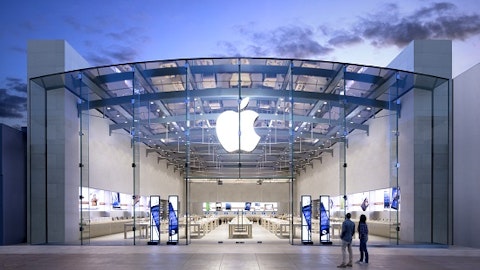
The Emergence of iTunes Radio
We’ve talked about it for months, and although Apple Inc. (NASDAQ:AAPL)’s “iRadio” has been named “iTunes Radio,” the same function still exists. ITunes Radio is an ad-supported service that can also be purchased for $25 per-year. Its primary role is to act like Pandora’s smart function, learning the taste of listeners. The two differ because of iTunes Radio’s integration with iTunes, allowing the purchase of individual songs.
The service’s effect on Pandora Media Inc (NYSE:P) has been discussed for the better part of 2013. Apparently, the two services are very similar. Obviously, with much of Pandora’s volume coming from iOS devices, the introduction of Apple Inc. (NASDAQ:AAPL)’s iTunes Radio could be damning to Pandora’s growth.
During Pandora’s last quarter the company grew its mobile listeners by 47%. Moreover, the company is finally becoming efficient, as revenue climbed 101% year-over-year. Therefore, Pandora continues to be popular and has more than 200 million subscribers. Thus, it controls 7.33% of total U.S. radio listening.
Any time that one service controls more than 7% of a massive industry such as radio, you have to be concerned with upside potential. The iPhone was 18% of the smartphone market in Q1. Therefore, with Pandora also being offered on Android (74% of smartphones) and desktop, it is possible that iTunes Radio won’t deliver as big a blow as many anticipate.
Pandora Media Inc (NYSE:P) is trading almost $4 off its 52-week high and is coming off an exceptional quarter. While I do worry about Pandora’s upside in terms of market share, I also acknowledge that many companies have attempted to offer radio services (ie Nokia) and nothing (except Pandora) has stuck thus far.
Last year, Apple Inc. (NASDAQ:AAPL) released its maps service and it was less than stellar. Yet, pressure to compete in the space led them to release the product before it was ready. With iTunes Radio, I worry that Apple Inc. (NASDAQ:AAPL) is making the same mistake. Furthermore, Pandora Media Inc (NYSE:P) has a massive IP portfolio, leading me to wonder if Apple will find itself in additional IP lawsuits with Pandora. With that said, I am buying the proven growth of Pandora Media Inc (NYSE:P) and I am selling the idea that Apple’s new service will be a game changer, until proven otherwise.
A Curveball That Might Have an Impact
While we all expected a service to compete with Pandora Media Inc (NYSE:P), iOS in the car was a bit unexpected. The service will mirror iPhone content in-car displays, including music. This new service is “Siri” redesigned, as you can send iMessages, access maps, make phone calls, and then listen to music with voice control. Obviously, this will be integrated with the new iTunes Radio, as consumers can choose an artist and then create a play list of their favorite songs.
When the news was announced, shares of Sirius XM Radio Inc (NASDAQ:SIRI) slipped 2%. The reason is that Apple is preparing to make an entrance into a space dominated by Sirius.
Over the last three years, Sirius XM Radio Inc (NASDAQ:SIRI) has been the clearest beneficiary of the auto boom in the U.S. The company’s service is offered in most U.S. manufactured vehicles. Sirius XM Radio Inc (NASDAQ:SIRI) then offers a trial service in hopes of adding new subscribers.
Sirius has excelled in creating new subscribers. During its last quarter, subscribers increased 9% to 24.4 million total subscribers. Therefore, much like Pandora controls the mobile listening arena, Sirius controls that in automotive.
Here’s my question: With Apple Inc. (NASDAQ:AAPL)’s new “in the car” service, how many people will view Sirius XM Radio Inc (NASDAQ:SIRI)’s services as necessary? Sirius charges $14.49 per month for its service yet Apple’s service will come standard. Already, Honda, Chevrolet, Mercedes, Kia, Volvo, and six other manufacturers are incorporating it into their new car models starting in 2014.
First off, this could lead consumers to purchase Apple products over Android, due to the integration. Secondly, I think this could deliver a blow to Sirius, especially with Kia and Chevrolet. Sirius XM is a $21.7 billion company that trades at 6.3 times sales with 11% growth. While auto sales are expected to experience continued growth, it’ll be interesting to see if consumers will pay the $14.49 per month when they have Apple in their car and a new-age music platform.
Final Take
Pandora CEO Joseph Kennedy essentially said that Apple Inc. (NASDAQ:AAPL) did not innovate enough to impress the market and steal market share. However, I beg to differ. I think the company’s new smart music service combined with in-car services could be a blockbuster in gaining market share from Android.
Pandora and Sirius XM might be impacted the most – but right now I am still bullish on Pandora Media Inc (NYSE:P) due to its overwhelming subscriber base; more than nine times that of Sirius. In my opinion, Sirius XM Radio Inc (NASDAQ:SIRI)’s success has been due to default, as it benefits from a bull auto market; but with a substantial competitor I find it hard to be quite as bullish moving forward.
The article Where Does iTunes Radio Hurt Most? originally appeared on Fool.com and is written by Brian Nichols.
Brian Nichols owns shares of Apple. The Motley Fool recommends Apple. The Motley Fool owns shares of Apple. Brian is a member of The Motley Fool Blog Network — entries represent the personal opinion of the blogger and are not formally edited.
Copyright © 1995 – 2013 The Motley Fool, LLC. All rights reserved. The Motley Fool has a disclosure policy.





